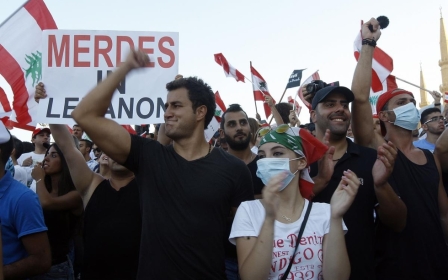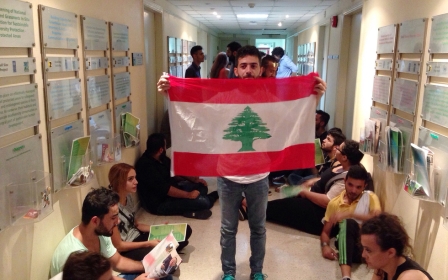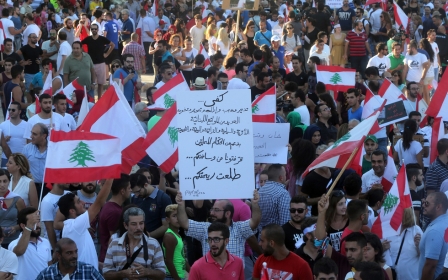Beirut's rubbish crisis drags on as protests escalate

Scuffles broke out in the centre of the Lebanese capital on Sunday as thousands of demonstrators protested near parliament to demand that MPs be replaced in a general election.
A coalition of Lebanese civil activists groups called a mass march in Beirut on Sunday to demand the resignations of Interior Minister Nohad Machnouk, after security forces beat and arrested dozens of protesters earlier in the week, and of Environment Minister Mohamed Machnouk over his handling of the country's refuse-disposal crisis.
“We call for a mass rally on Sunday at 5pm beginning from the Beirut River Bridge in Bourj Hammoud and ending at [Downtown Beirut’s] Nejmeh Square,” the coalition, which includes groups such as the People Demand, the We Want Accountability and the You Stink movement, said in a statement.
The protest marched to Martyrs Square, where riot police were deployed. According to several witnesses, journalists were attacked by supporters of Nabih Berri, the speaker of parliament.
Heaps of uncollected rubbish have piled up in Beirut’s streets since the middle of the summer, and the groups have come up with an immediate environmental emergency plan to deal with the crisis.
Lebanon’s government two weeks ago approved a plan to tackle waste management, but it has been rejected by the "You Stink" movement. The government’s plan and its supposed implementation is also being questioned by local municipalities and environmental experts.
"You Stink" emerged as a movement to demand a solution to trash collection but has broadened its target to the entire political class, accused of being corrupt and inept.
Lebanon's last legislative elections were held in 2009, and parliament has twice extended its own mandate, citing internal political divisions and regional instability as justification.
On Sunday, there was a heavy security presence around the central Beirut square housing the parliament complex to keep demonstrators at bay.
Amid pushing and shoving, several protesters and security personnel fainted and were given first aid.
Lebanon's political system is deeply divided between two main blocs, which has caused months of political paralysis.
One bloc is led by the Shiite movement Hezbollah, allied with Syria and backed by Iran. The other is headed by Sunni former prime minister Saad Hariri, who is supported by Saudi Arabia and the West.
The country has been without a president for more than a year, as a divided parliament has been unable to fill the post despite meeting more than two dozen times.
New MEE newsletter: Jerusalem Dispatch
Sign up to get the latest insights and analysis on Israel-Palestine, alongside Turkey Unpacked and other MEE newsletters
Middle East Eye delivers independent and unrivalled coverage and analysis of the Middle East, North Africa and beyond. To learn more about republishing this content and the associated fees, please fill out this form. More about MEE can be found here.




